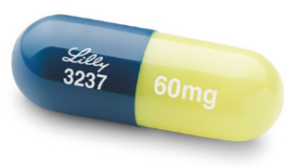
Cymbalta snuffed out my mother’s crippling depression.
Yes, the antidepressant Cymbalta literally saved my mother’s life. Cymbalta wiped out my mother’s depression and panic attacks, with no side effects save for a few brief dizzy spells at the beginning.
My mother became disabled from depression, which included a weight loss of 12 pounds (mostly muscle) from refusing to eat, and reverted to weeping over the tiniest issues.
I didn’t need medical training to recognize a textbook case of clinical depression, and I recommended an antidepressant (though not naming Cymbalta specifically).
It all began when I planned on living with my parents for about three days, to help my mother recover from knee arthroscopic surgery.
Little did I know that a power-hungry depression awaited me and would hold me hostage there for over two months.
In hindsight, I realize that subtle signs of depression had been present for several weeks preceding the surgery.
However, the depression began stomping its feet the morning of the knee surgery, and had an unforgiving accomplice: panic attacks.
My mother had had orthopedic surgeries before, but never sobbed or was convinced she was dying like this time.
The problem was merely a meniscus tear in the knee. She also complained that the fingers of both hands were tingly.
Several days after the surgery, I suspected clinical depression and I began urging my father for “psychiatric intervention,” and that “she needs an antidepressant!”
Both my mother and father adamantly opposed antidepressants.
My mother denied having depression, and attributed her apathy, overall weakness, inability to hold herself together while doing simple shopping, comments about wanting to die, excessive crying, loss of appetite and withdrawal from daily activities to:
1) post-surgical knee discomfort, and then 2) a developing pain in both hands and arms, along with continuing tingling in the fingers.
My father admitted something was wrong, but attributed it to “lingering effects of anesthesia” (even five days out from surgery), and then to the hand pain (eventually diagnosed as carpal tunnel syndrome).
Meanwhile my mother often talked about her funeral, gave us “If I die…” talks, and often said her entire body hurt.
“She has depression!” I kept harping to my father, who still opposed antidepressants and accused me of trying to play doctor.
After six weeks of taking care of my mother, including daily battles to get her to eat, I finally convinced my exhausted father to embrace an antidepressant.
I chose Cymbalta because at the time, we thought that her frequent shoulder pain (which would trigger hard sobbing) was residual nerve pain from the double carpal tunnel syndrome surgery.

In addition to nerve pain, Cymbalta is prescribed for panic attacks, and my mother often felt as though death were imminent.
I showed my father information from a Web site about how major depression can cause whole-body pain and amplify pre-existing joint pain by heightening a person’s perception of pain.
I just had a gut feeling that the Cymbalta would take out the depression like a tank.
That evening my mother took one 30 mg Cymbalta capsule. “I don’t know how long it will take before it kicks in,” I told her, “But believe me, this is the RIGHT thing to do.”
Next morning, my mother awakened feeling vibrant, pain-free, and eager for a big breakfast.
Absent was the scene for the past six weeks: a withered, crying, wasted-looking stranger. My mother’s eyes were alive, voice robust. She said, “I feel GREAT!”
I said, “It’s the drug, the Cymbalta, it worked!”
My mother needed no help sitting upright; she popped right up and got ready for the day as though nothing were wrong. “For the first time in weeks, I feel human!” she said.
And for the first time in seven weeks, she washed her hair. My father was floored by the drug’s effect.
The Cymbalta prescription was 30 mg daily for the first week, then 60 mg the second week.
The Cymbalta was working so beautifully that on the eighth evening, I kept the dose at 30 mg (I was in charge of administration).
Next day, my mother had a partial relapse and asked, “Do you think it’s because you didn’t double the dose?” I said, “Yes. Well, tonight you’re getting 60 mg.”
Early next morning while still in bed, my mother boldly said, “I feel SO strong, like I can just swing my legs off the bed and stand right up!”
She then began talking about going out for breakfast and doing some shopping to buy ingredients to make bread and meat pies — while still in bed.
Another three weeks on 60 mg worked wonderfully, and then we had to increase to 90 mg. Cymbalta restored my mother’s appetite, wiped out panic attacks, brought back her laughter, resurrected social connections, and motivated her to stick to an exercise plan.
Since taking Cymbalta, my mother has had NO “my whole body hurts” episodes, and the shoulder pain (eventually diagnosed as rotator cuff tears) has significantly diminished — or perhaps her perception of it has.
And when the shoulder pain does occasionally act up, my mother doesn’t sweat it, whereas pre-Cymbalta, she’d sob away and completely shut down.
About five weeks after starting Cymbalta, my mother’s energy level began plummeting; she felt increasingly drained and excessively sleepy, even though her mood remained normal.
We took her to the ER, and a blood test revealed a medical condition, hypothyroidism, that’s known to cause depression.
She started treatment the next day. In retrospect, my mother had been showing signs of low thyroid for several months, but we didn’t think much of the subtle symptoms.
Also, about five weeks after beginning Cymbalta, my mother signed with a new medical plan that didn’t cover Cymbalta, and thus had to gradually transition to a comparable dose of Effexor. These two unexpected developments extended my stay with my parents.
Effexor, like Cymbalta, is a seratonin/norepinephrine reuptake inhibitor. The transition from Cymbalta to Effexor was smooth, save for a disabling case of persistent dizziness on the last dose-changing day — yet despite that, my mother was upbeat.
In summary, my mother is now gradually tapering off Effexor; apparently, the depression is now under control with the treatment for that medical disorder.
There are NO problems with the Effexor tapering, and absolutely NO relapse of the depression, which is strong evidence that the depression’s underlying cause was the low thyroid.
(Original publication date: January 2010)









































